970x125
Rutherford County Library System (RCLS) in Tennessee have made several headlines during this wave of book censorship. They voted to ban all trans books for minors in the library earlier this year, and the board of the Lineburgh Public Library–one of their branches–voted to remove “transgenderism” books just weeks before the decision was made by the county’s board. Months after passing their anti-trans book policy, the RCLS decided to overturn it. That decision wasn’t out of a change of heart but rather, fear of litigation.
Rutherford County includes the city of Murfreesboro, which passed an anti-LGBTQ+ law in 2023 and later repealed, paying a steep fee following a lawsuit settlement. It is also home to Rutherford County Schools, which have been among the biggest book banners in the state. The ACLU and PEN America filed a lawsuit in the school district over their censorship of materials earlier this year.
Now, the RCLS board is shutting down several of its library branches to “meet new reporting requirements from the TN State Secretary’s Office.” The vaguely worded post offers little insight into what these reporting requirements are, and the post does not explain why two branches of the library system need to shut down for several days in order to meet them.
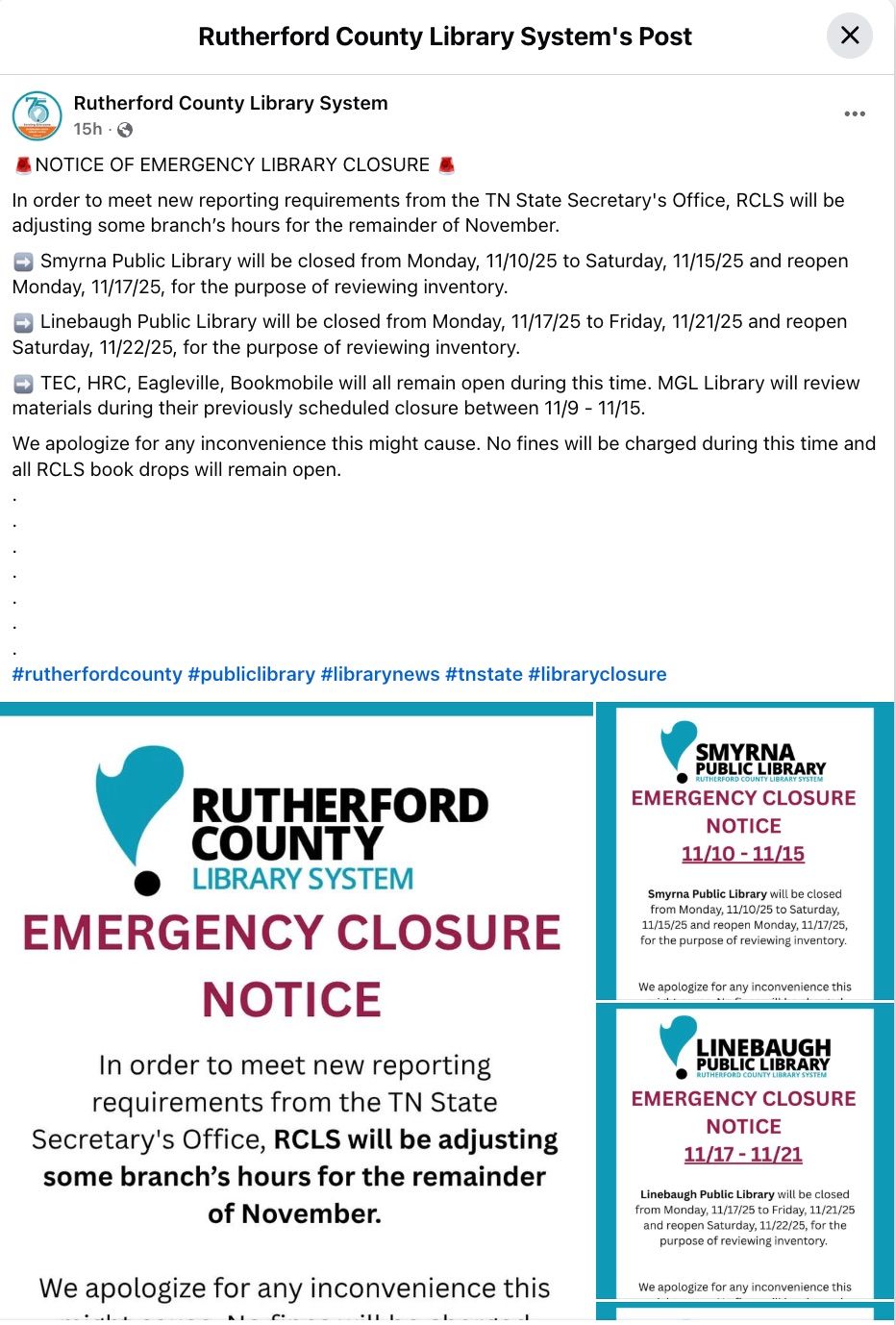
The answer is likely that this will be a mass book banning without public oversight.
Literary Activism
News you can use plus tips and tools for the fight against censorship and other bookish activism!
Tennessee has been actively updating their statewide library policies since the passage of their 2022 Age-Appropriate Materials Act. In 2024, the law was amended to add even more categories of books deemed illegal with the state. These include books containing nudity, sexual excitement, sexual conduct, or excess violence; it also includes books appealing to “prurient interests,” including LGBTQ+ material.
Both of these laws apply to public school libraries, but Tennessee has also updated their public library standards and the language within it mirrors that of the school-based law. This happened some time in 2023 and is likely related to a suite of legislation related to codifying biological sex as the only accepted identity in the state (another library system in Tennessee, Sumner County–also deeply involved in censorship of materials–recently failed to pass an anti-trans book policy for the fourth time. Their proposal references Act 2023, PC, TCA 4-21-102, and TCA 10-3-10 as justification; see page 9 of the .pdf). It’s also likely blatant over-application of the law.
The 2025 Tennessee Standards for Public Libraries in the Regional System states the following on page 25:
Collection Development Policy (includes a Materials Reconsideration policy)
Minimum Requirements
- All materials are selected by the local public library in accordance with the individual public library’s full Collection Development Policy;
- The public library’s Collection Development Policy is approved by the public library’s Board of Trustees (or equivalent governing body) at least annually;
- All books selected for purchase by the individual public library, through the Regional Library System or otherwise, are reviewed by the public library’s director before purchase, with the library director then sharing a list or lists of newly purchased materials with the public library’s Board of Trustees (or equivalent governing body);
- No funds received are used to purchase, nor will the library otherwise acquire, material that constitutes “child pornography,” is “pornographic for minors,” or is “obscene;”
- Books and materials that contain sexual themes or content are reviewed by the public library independently for age-appropriateness and cataloged accordingly – even if this overrides the age appropriateness recommended by the publisher;
- Request for Reconsideration of Materials: The library has a written, publicly accessible library materials challenge policy that (a) defines which parties may dispute or challenge the library’s age-appropriate designation on materials, with such definition, at a minimum, including a parent or guardian of a minor within the library district, (b) defines the process by which a materials challenge can be initiated, and (c) provides for the results of any such dispute or challenge to be disclosed in the public library’s official Board of Trustee minutes.
Starting in September of this year, all public libraries in the state began to receive letters from Tennessee Secretary of State Tre Hargett. He emphasized that for libraries to receive their funding from the state, they needed to comply with all state and local laws.
The letter specifically cites Trump’s “Defending Women from Gender Ideology,” and states that all libraries needed to review their juvenile materials to ensure they are in compliance with Tennessee’s age-appropriateness law, all federal laws, and all federal executive orders (which are not legally binding and do not override the Constitution).
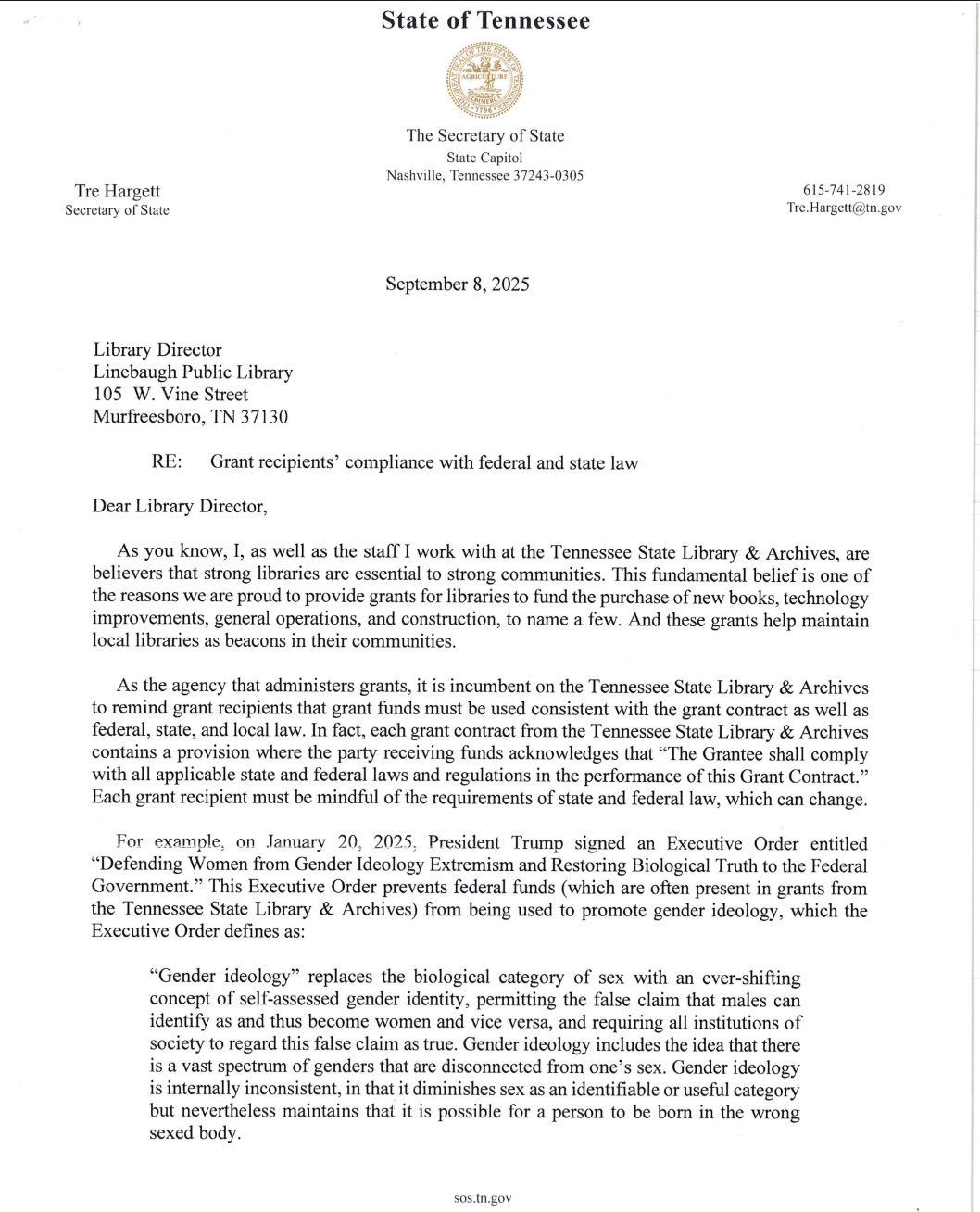

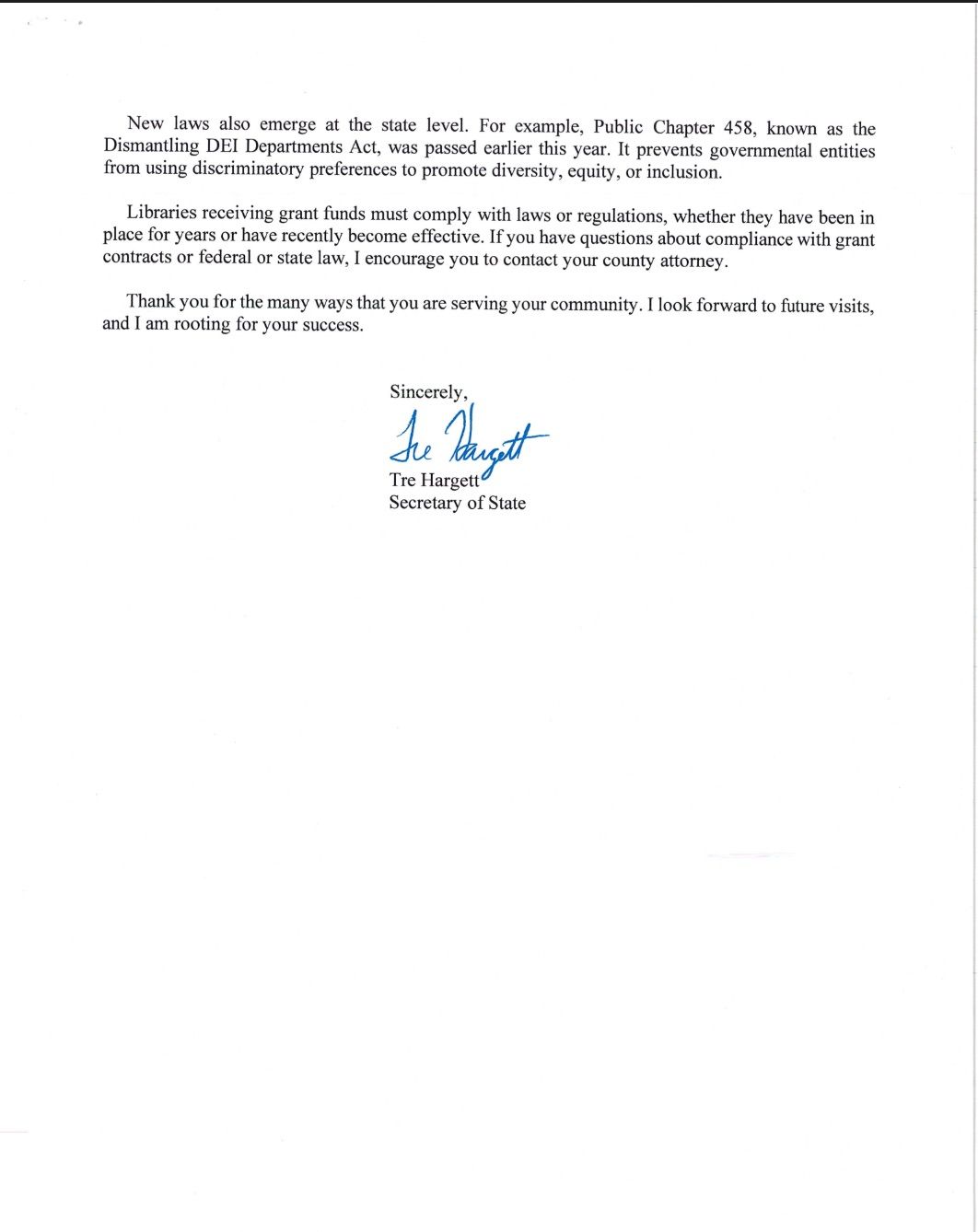

But why the urgency to shut down the library to review materials? It could be related to a second letter that the Secretary of State sent out in late October, demanding the removal of any books out of compliance of the law within 60 days. The RCLS board chair, the director of the RCLS, and the branch manager of the Linebaugh Public Library received this:
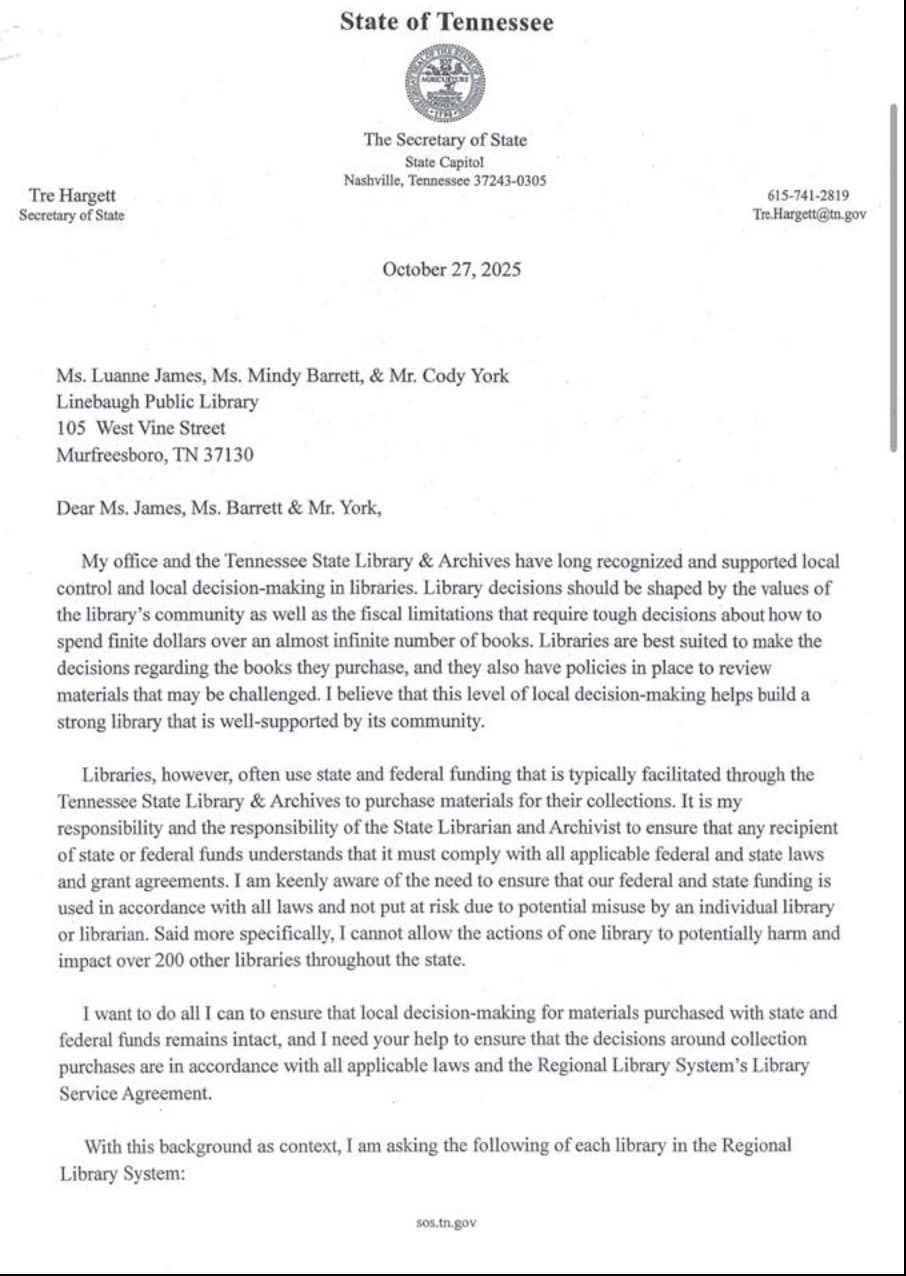

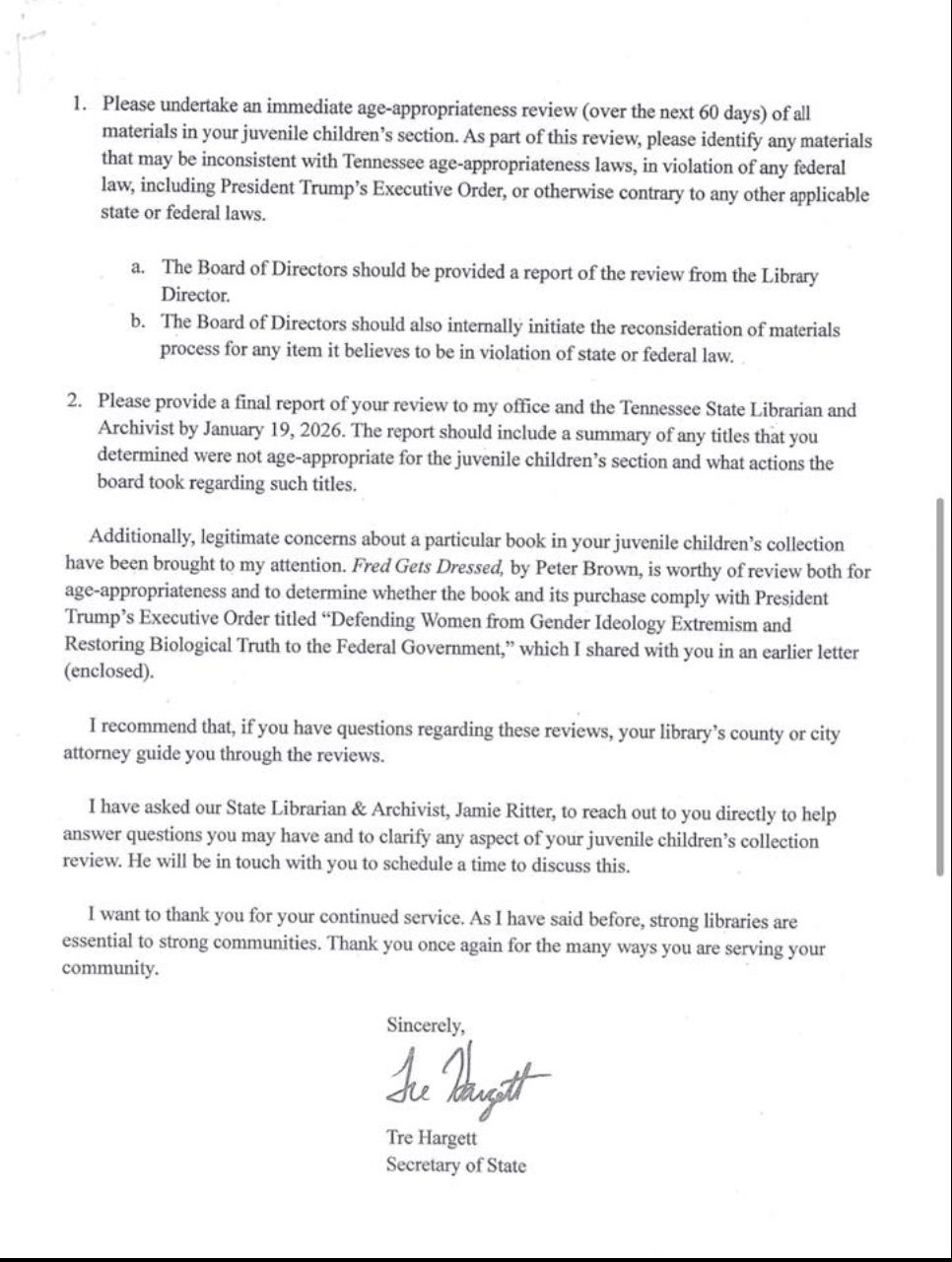

Like we saw happen similarly this summer in Florida, the Tennessee Secretary of State is attempting to wield power in order to drive libraries into compliance with standards that are not legally binding and that indeed are intended to led to mass bannings. Unlike in Florida, though, where schools complied out of fear, in Rutherford, at least, such demands to remove LGBTQ+ materials from the library aligns with the board’s long-term goals. It’s a convenient means of subverting their fears of litigation, which drove them to change their anti-trans book policy earlier this summer. If the directive is from the state, then they “have to” comply.
The Tennessee Secretary of State is granting permission slips to public library boards to ban away. It’s done under the guise of threatening them for noncompliance, but as we know, Rutherford and other systems in the state, including Sumner County, have been looking for the means by which to remove as many LGBTQ+ books from the library as possible.
Rutherford County Library System hired a new library director in June, and now, the director has been put in the position of responding to inquiries from residents wondering why the library is closing down two branches to “review” materials. The new director hails from York County Libraries in South Carolina, which itself has been subject to mass blanket book bans since October of last year.
There is an active anti-censorship group in Rutherford. They were among the first to indicate concerns over potential new changes to the library’s collection policy in late October, just before this closure was announced. Rutherford County Library Alliance will likely begin to organize a response and action in the coming days and will be the first to share updates about the library’s closures. Something library advocates can do in addition to following their lead is keep an eye on any and all LGBTQ+ (and specifically trans-related) books available in the RCLS system. Chances are better than good that titles which have been pulled from school districts statewide will be among the first targets in this potential purge. If you’re local and are able, head into the library this week to borrow any and all titles you think may be at risk of “disappearing” from shelves.



